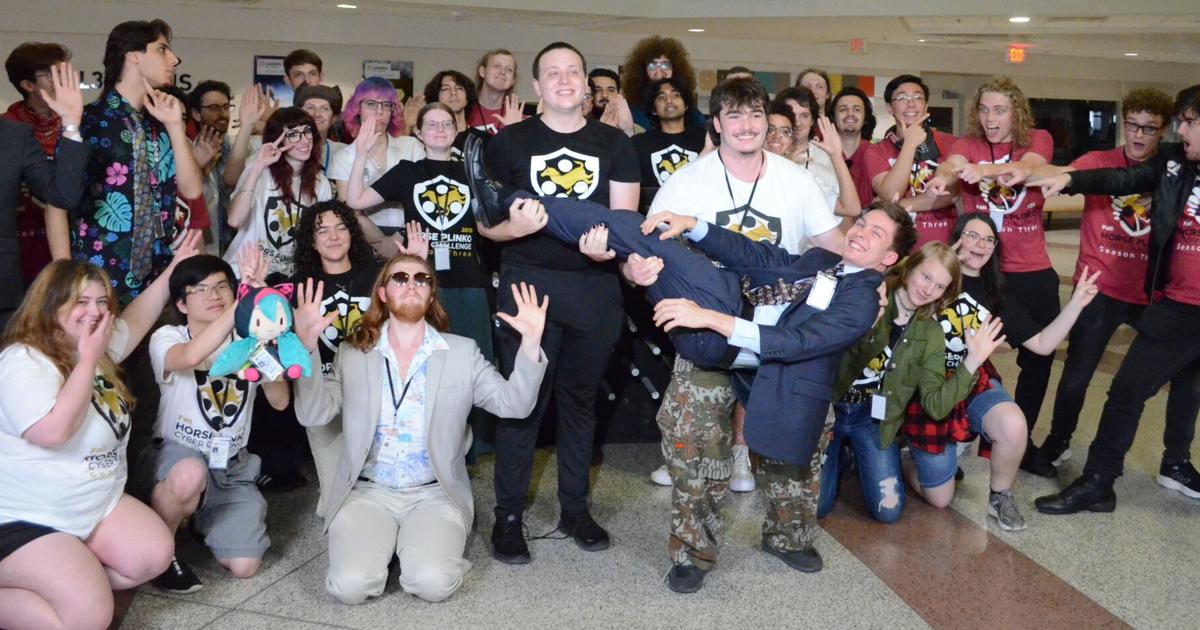The Horse Plinko Cyber Challenge organizers and officials posing for a photo in celebration in the UCF Engineering II atrium after the challenge was completed on Sunday.
Courtesy of HACK@UCF
In the face of difficulties, HACK@UCF successfully hosted its third annual Horse Plinko Cyber Challenge over the course of Saturday and Sunday.
The challenge, or HPCC, is a student-organized cybersecurity defense competition in which competing teams, categorized as Blue teams, have unique names and consist of four people. Each team’s purpose is to defend against a real-time cyber-attack being committed by the opposing Red team.
About two hours into the event, on Saturday, event organizers started sprinting and rushing throughout the UCF Engineering II atrium. Some headed to participant rooms, others headed towards the Lockheed Martin Cyber Innovation Lab, all of them moved with haste.
Two out of the four rooms used for the event had lost internet connection. Inside the Lab, members from the Admin team, Infrastructure team and Hacker team huddled over a table with an ethernet cord split in half in hopes of fixing the connection errors the participants faced.
After spending almost three hours troubleshooting, the organizers decided they would have all teams compete in the UCF Engineering II atrium on Sunday and offer the affected participants from Saturday a chance to compete again.
“It felt like the world was ending on day one because half of the competitors we had to send home because of one tech issue, which didn’t feel good at all. No one wants splice cables for their own competition, and that’s the level of panic we were in,” said John Vezzola, junior computer science major and Vice President of HACK@UCF. “I did not sleep till 3 a.m. until all of our disaster plans were put into place and all our replacement infrastructure was thoroughly tested.”
Sunday, clicking and clacking could be heard echoing through the atrium as HPCC proceeded as planned, and the participants proactively defended their active services from the Hacker Team.
“Day two went significantly better than day one,” said Adit Raikumar, junior computer science major and Infrastructure team member. “We spent tireless hours re-working our infrastructure and had numerous backup plans to ensure that this competition is going to happen, and it paid off very well with Lots of happy competitors on day two.”
Both days sponsors, such as Lockheed Martin, Amazon, ThreatLocker and Texas Instruments, were present. The sponsors met with participants to network on a blocked lunch schedule.
Lockheed Martin shared excitement for the event.
“Lockheed Martin is a proud UCF sponsor to include HACK@UCF and the Lockheed Martin Cyber Innovation Lab. This event was a great opportunity for students across Florida to learn more about cybersecurity and compete with other teams,” commented Lockheed Martin.
During the competition, the sponsors gave workshops to those who were not competing, such as volunteers or observers.
At the end of the event, the sponsors held a questions and answers session where participants were able to ask industry and professional questions.
“It’s good to see the continuous evolution of the event and what it has progressed into, how it’s come from being a proof of concept, to becoming an actual event,” said UCF alumnus and former infrastructure lead for HPCC Caleb Sjostedt. “The event definitely went smoother today compared to day one. We were able to stay dynamic and adapt to the challenges brought from our environment to provide a great experience for our competitors.”
On Saturday, the winners were team 18, Wojtek the Soldier Bear , and on Sunday, the First Place was team 10, PlinkU.
Angie Jiang, junior computer science major and member of PlinkU, commented on the experience, “A great event for beginners looking to get into cybersecurity. Even if you don’t know very much about cybersecurity, you can learn a lot from participating.”

